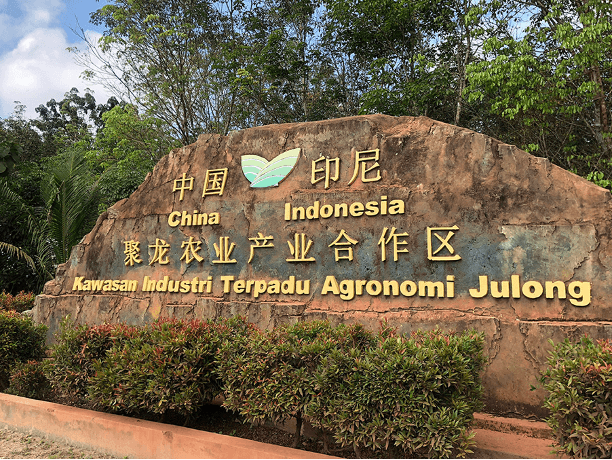In recent years, China and countries along the Belt and Road actively carried out cooperation in the field of agriculture for regional food security. China has signed agricultural and fishery cooperation documents with more than 80 countries, and more than 650 agricultural investment cooperation projects have been carried out in countries along the Belt and Road. Affected by COVID-19, extreme weather, geographical conflicts, and other factors, the global food industry chain and supply chain have been impacted, making it imperative to maintain regional food security through agricultural cooperation in countries along the Belt and Road.
Case: Julong Project
Type: Agriculture (Palm Oil)
Country: Indonesia
Project brief:
In 2006, following the Chinese government’s call for ‘Going out’, Julong, a privately-owned enterprise focusing on palm oil-related businesses, officially launched its first foreign investment in Indonesia’s palm oil plantation. This Tianjin-based company has planted 60,000 hectares of oil palm trees, with a total investment of nearly USD 1.3 billion. The plantation has recruited nearly 10,000 locals, including employees and part-time workers, and only has 70 Chinese personnel in the plantation. The China-Indonesia Julong Agricultural Industry Cooperation Zone with five parks on Kalimantan Island was promoted as an economic and trade cooperation zone in August 2016. Today, the Julong Group owns 11 palm oil plantations in Indonesia (mainly in Kalimantan), with a total area of nearly 200,000 hectares[1]. Julong has also expanded to palm oil processing and logistics businesses in multiple sites in Indonesia and owns three crushing mills, two river port logistics warehousing bases, and several other plants under construction.

Image: Julong Agricultural Industrial Cooperation Zone. [photo: China Council for the Promotion of International Trade]
[1]Tan, X., & Yeremia, A. (2022). The socio-environmental challenges for China’s palm oil business in Indonesia. Melbourne Asia Review. 10.37839/MAR2652-550X11.7
Case: China-Indonesia "Two Countries, Twin Parks" Agricultural Cooperation
Type: Agriculture (Industrial Park)
Country: Indonesia
Project brief:
China and Indonesia's "Two Countries, Twin Parks" project is based on the Fuzhou Yuanhong Investment Zone in Fujian Province and zones such as the Bintan Industrial Estate in Indonesia. It explores establishing a twin park cooperation mechanism that integrates industries, facilities, and policies. In 2019, the concept of the "Two Countries, Twin Parks" between China and Indonesia was proposed; in January 2021, the "Two Countries, Twin Parks" memorandum between China and Indonesia was signed. According to the agreement, under the project, a cooperation platform will be built, with the food industry chain and supply chain as the main body, creating a green channel for investment and trade between China and Indonesia.
At the 23rd China International Fair for Investment and Trade that concluded on 11 Sep 2023, four new ventures were signed and will be launched in the Yuanhong Investment Zone in the city of Fuzhou in east China, the site of the Chinese park of the "Two Countries, Twin Parks" project between China and Indonesia. The four deals involve the wholesale of Indonesian aquatic products, fishing and processing, among other businesses. Fuzhou authorities say these deals will inject fresh momentum into China-Indonesia cooperation.

Image: An Indonesian exhibitor (2nd R) presents products to visitors during the 2023 China (Fuzhou) International Seafood & Fisheries Expo in Fuzhou, 2023. [Photo/Xinhua]
Case: COFCO in Thailand
Type: Agriculture (Bio-tech in Cassava Planting)
Country: Thailand
Status: Ongoing
Organisation: COFCO (China National Cereals, Oils and Foodstuffs)
Project brief:
Cassava is one of the most important cash crops in Thailand. Farmers need to send fresh cassava to factories for processing as soon as it's harvested to avoid losses caused by deterioration. COFCO Biochemical (Thailand) obtained the Thailand patent for the technological process of fresh cassava fermentation to produce citric acid, which has helped the locals to increase their income from growing cassava.
However, the technological breakthrough was then followed by more challenges, as the factory's operation was not supported by local farmers at the beginning. To establish a win-win relationship, COFCO decided to directly communicate with and procure from local farmers. Now, farmers not only harvest cassava during dry and cool seasons, but all year round with COFCO as their steady procurement party. In 2022, the company acquired approximately 81,000 tonnes of fresh cassava, generating over 200 million Thai Bhat ($5.55 million) of income for nearby farmers. The company also offers room for their Thai staff's career development. Both their professional skills and language abilities have improved during their work experience.

Image: COFCO Biochemical (Thailand) Co Ltd's factory in Rayong Industrial Zone in Thailand. [Photo/China Daily]